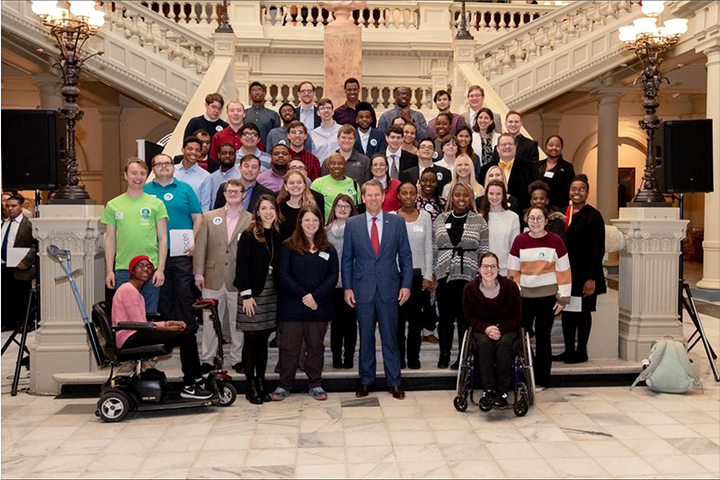Disability community advocates to prioritize 3 key areas in Georgia’s 2021 legislative session
 Last year during Georgia's legislative session, numerous organizations, including GCDD, worked to make sure that the perspectives of people with disabilities were being considered.A legislative agenda outlines the public policy priorities on which an organization and/or group of advocates will focus. During Georgia’s 2020 legislative session, the Georgia Council on Developmental Disabilities (GCDD) introduced a legislative agenda that focused on “disability in all policy.” The idea for this type of legislative agenda is to ensure that people with disabilities and their families are considered in all areas of legislation.
Last year during Georgia's legislative session, numerous organizations, including GCDD, worked to make sure that the perspectives of people with disabilities were being considered.A legislative agenda outlines the public policy priorities on which an organization and/or group of advocates will focus. During Georgia’s 2020 legislative session, the Georgia Council on Developmental Disabilities (GCDD) introduced a legislative agenda that focused on “disability in all policy.” The idea for this type of legislative agenda is to ensure that people with disabilities and their families are considered in all areas of legislation.
Last year numerous organizations, including GCDD, worked with legislators to make sure that the perspectives of people with disabilities were being considered. This included any policy area from school choice to elevator compliance. As a result, the voices of the disability community are being represented in new and innovative spaces.
Advocates plan to continue their efforts centered around “disability in all policy” during the upcoming 2021 session. Specifically, three key priority areas expect to be highlighted during the 2021 session, especially during GCDD’s 2021 Advocacy Days.
1. Accessing HCBS Medicaid waivers
In Georgia, home and community-based (HCBS) Medicaid waivers allow people who are aging and/or have disabilities access the support they need to live in their home or community instead of an institution. Such assistance may include independent living, employment supports, financial training, etc. The waitlist for the NOW/COMP Medicaid waiver, which serves eligible Georgians with developmental disabilities, includes over 6,000 people.
Last year, advocates across the state worked to make sure that new waiver slots continued to be funded, even during significant budget cuts across most state agencies. Although the governor’s office originally recommended zero new waiver slots, the disability community was successful in advocating for the addition of 100 new waiver slots once the final budget was passed and signed by Governor Brian Kemp.
To further shine a light on the waiver waitlist problem in Georgia, GCDD will also premiere its documentary “6,000 Waiting” during the upcoming legislative session. These powerful stories of Georgians with disabilities will continue to highlight the need for additional funding for waivers.
2. Supporting inclusive postsecondary education (IPSE) programs
For the past decade, IPSE programs have grown and developed into nine different programs across Georgia. These programs provide inclusive learning opportunities for college students with intellectual disabilities. These students typically would not have the option to attend college, as many do not receive a traditional high school diploma or have difficulty with the competitive admission standards; however, IPSE programs were designed to deliver the true college experience, while preparing students for successful careers post-college. In fact, the employment rate of IPSE students is about 58%, compared to just 34% for Georgians with disabilities. The employment rate drops to only 24% when discussing Georgians with a cognitive disability. Learn more about employment data for people with disabilities.
Given the effectiveness and importance of IPSE, advocates have focused their efforts on improving the support and funding for the programs during previous legislative sessions. This year, GCDD plans to focus on the 16% cut that was made to the programs’ budgets during the last legislative session. Due to Covid-19’s impact on our economy, many services saw budgets cut, but IPSE received a higher cut than many. In addition to the state cuts, IPSE programs have also been negatively impacted by the Georgia Vocational Rehabilitation Agency’s (GVRA) decreased funding model for student support, as well as GVRA’s removal of academic transition teacher (ATT) funding.
Organizations and constituents plan to advocate to reinstate those funds to ensure the success and sustainability of the programs throughout Georgia.
3. Expanding competitive, integrated employment
As mentioned above, Georgia’s rate of employment for people with disabilities is very low, even when compared to the national average, and only about 16% are working in competitive, integrated employment. This means that only 16.3% of Georgians with developmental disabilities have jobs that pay at least minimum wage and are in a workplace in the community, alongside their peers without disabilities, that is not owned or managed by a provider of support services. GCDD is committed to increasing the rate of Georgians who participate in competitive, integrated employment.
According to the Workforce Innovation and Opportunity Act (WIOA), competitive, integrated employment is defined as “full or part-time work at minimum wage or higher, with wages and benefits similar to those without disabilities performing the same work, and fully integrated with coworkers without disabilities.”
Learn more about what to expect during Georgia’s 2021 legislative session in GCDD’s “Making a Difference” magazine.
The Georgia Council on Developmental Disabilities (GCDD) is a state leader in advocating alongside people with developmental disabilities. We advance social change, public policy and innovative practices that increase opportunities for individuals with developmental disabilities and their families to thrive where they live, learn, work, play and worship.
The article ran in the Atlanta Business Chronicle on 1/15/2021.
This article also ran in the LSA-DN Weekly Update | Lutheran Services in America on 1/22/2021.
